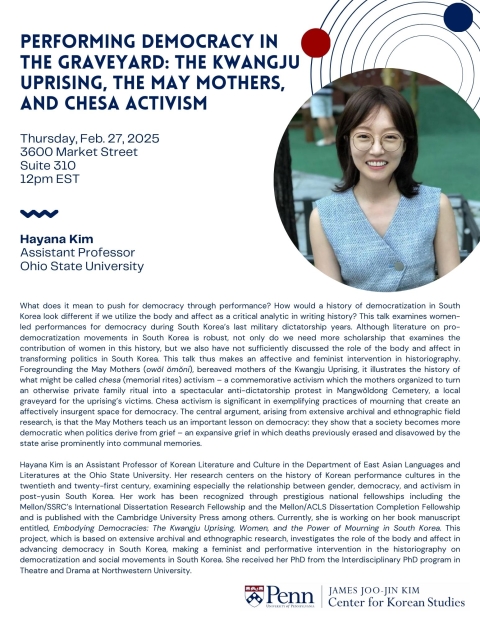
Korean Studies Colloquium
3600 Market Street, Suite 310
What does it mean to push for democracy through performance? How would a history of democratization in South Korea look different if we utilize the body and affect as a critical analytic in writing history? This talk examines women-led performances for democracy during South Korea’s last military dictatorship years. Although literature on pro-democratization movements in South Korea is robust, not only do we need more scholarship that examines the contribution of women in this history, but we also have not sufficiently discussed the role of the body and affect in transforming politics in South Korea. This talk thus makes an affective and feminist intervention in historiography. Foregrounding the May Mothers (owŏl ŏmŏni), bereaved mothers of the Kwangju Uprising, it illustrates the history of what might be called chesa (memorial rites) activism – a commemorative activism which the mothers organized to turn an otherwise private family ritual into a spectacular anti-dictatorship protest in Mangwŏldong Cemetery, a local graveyard for the uprising’s victims. Chesa activism is significant in exemplifying practices of mourning that create an affectively insurgent space for democracy. The central argument, arising from extensive archival and ethnographic field research, is that the May Mothers teach us an important lesson on democracy: they show that a society becomes more democratic when politics derive from grief – an expansive grief in which deaths previously erased and disavowed by the state arise prominently into communal memories.
Hayana Kim is an Assistant Professor of Korean Literature and Culture in the Department of East Asian Languages and Literatures at the Ohio State University. Her research centers on the history of Korean performance cultures in the twentieth and twenty-first century, examining especially the relationship between gender, democracy, and activism in post-yusin South Korea. Her work has been recognized through prestigious national fellowships including the Mellon/SSRC’s International Dissertation Research Fellowship and the Mellon/ACLS Dissertation Completion Fellowship and is published with the Cambridge University Press among others. Currently, she is working on her book manuscript entitled, Embodying Democracies: The Kwangju Uprising, Women, and the Power of Mourning in South Korea. This project, which is based on extensive archival and ethnographic research, investigates the role of the body and affect in advancing democracy in South Korea, making a feminist and performative intervention in the historiography on democratization and social movements in South Korea. She received her PhD from the Interdisciplinary PhD program in Theatre and Drama at Northwestern University.
 James Joo-Jin Kim Center for Korean Studies
James Joo-Jin Kim Center for Korean Studies